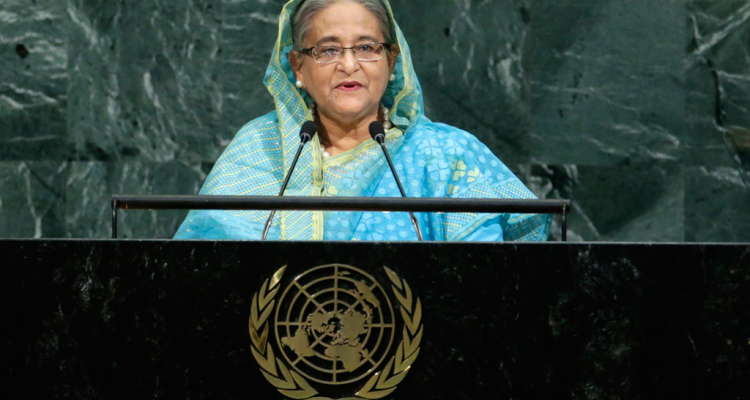Honourable Prime Minister of Bangladesh Sheikh Hasina has addressed the UN General Assembly on September 25, 2021, She initiated her speech by saying, “On the momentous occasion of the United Nations’ 76th anniversary, Bangladesh joins the world community in reaffirming its steadfast commitment to the United Nations Charter’s Purposes and Principles. The United Nations has championed human progress on many fronts during the last 76 years including, peace and security, human rights, decolonization, women’s empowerment, sustainable development, and so on”.
In her address, she deliberated on six major contingencies the world is currently facing. Current situation of the Rohingyas in Bangladesh, the post-COVID 19 scenario worldwide, Vaccine divide, collapse of global education system due pandemic, ‘Mujib Climate Prosperity Plan – Decade 2030’ to address climate vulnerability, Bangladesh’s graduating out from LDC, Bangladesh’s contribution to UN peace keeping effort and Bangladesh’s joining of peaceful nuclear club.
Prime Minister Sheikh Hasina has presented proposals to world leaders to combat the deadly virus with new, inclusive, and efficient manner, referring to Covid-19 as a common enemy. She stated, “Unfortunately, this ailment appears to be here to stay, and we must, like in the past, come up with new, inclusive, and worldwide solutions to combat this common enemy. I’d like to draw attention to a few specific difficulties in this regard.”
Sheikh Hasina stated in her first proposal for a Covid-free future and said that “We must ensure ubiquitous and affordable access to vaccines for people around the world,” According to the World Bank, 84 percent of vaccination doses have been distributed to people in rich and higher middle-income countries so far, while low-income nations have gotten less than 1%. She stated that the immunization disparity must be addressed immediately. We can’t plan a long-term recovery and be safe if we leave millions of people behind.” She also suggested that transferring vaccination innovations rapidly could help assure vaccine fairness. She stated that Bangladesh is ready to produce vaccines on a large scale if technical know-how is shared and patent waivers are allowed. Hasina stated at the United Nations General Assembly that Covid-19 vaccinations should be treated as a “global public good.” Many other leaders mirrored this sentiment earlier. However, these pleas have mostly gone unheeded. Instead, we’ve witnessed an increase in ‘vaccine divides’ between affluent and poor countries.”
In her second proposal, PM Sheikh Hasina claimed that the epidemic has disproportionately impacted climate-vulnerable countries. She noted the climate change issue and stated that climate change’s terrible effects will be permanent unless prompt action is taken. No country, wealthy or impoverished, is immune to the negative consequences. Therefore she urged developed and developing countries to reduce carbon emissions, pay for losses and damages, and provide enough funding and technology transfer for adaptation and resilience development. She expressed her belief that the upcoming COP-26 Summit in Glasgow would be an excellent venue for rallying support for such innovative and inclusive proposals. As the chair of the Climate Vulnerable Forum and the Vulnerable Twenty Group of Finance Ministers; she added that Bangladesh has announced the while establishing a transformative plan from climate vulnerability to climate prosperity.
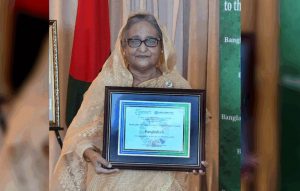
As she moved to the third issue, she highlighted the sudden collapse of the educational institutions all over the world due to the COVID-19 situation. She stated that the pandemic had seriously interrupted the education system and that millions of students in low-income nations lacked the resources and technology to participate in remote learning facilities, jeopardizing decades of enrolment and literacy progress. She also added, “We need a worldwide strategy that prioritizes education recovery by investing in digital tools and services, internet access, and teacher capacity building. We also call on the UN system to rally support and resources to achieve this goal.” Covid-19, according to the prime minister, has shown the weakness of the global response to catastrophes. It has also brought attention to the necessity for global solidarity and collaboration to respond effectively to Covid-19.
Despite the difficult obstacles provided by the Covid-19 outbreak, Hasina stated that Bangladesh is on pace to graduate from the LDC designation. The Covid-19 pandemic, on the other hand, has jeopardized several countries’ graduation prospects and ambitions. Bangladesh looks forward to getting more help from our development partners for an incentive-based graduation system to inspire and incentivize sustained graduation. Bangladesh expects meaningful outcomes from the Doha conference, she said, as one of the co-chairs of the Preparatory Committee for the LDC 5 Conference. This will allow more countries to sustainably graduate out of the LDC designation.
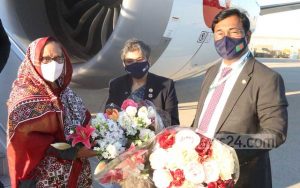
The prime minister stated in her fifth proposal that migrants were frontline contributors during the pandemic as critical employees in health and other emergency services. However, many of them have been disproportionately harmed as a result of job losses, wage reduction, lack of access to health and other social services, and compulsory return. She also said to treat the immigrants as more humanely as possible so that they can feel their worth as resourceful human beings and can repay the hosting country with their knowledge and efforts. Bangladesh’s foreign policy, she said, continues to prioritize peace. Bangladesh remains deeply dedicated to establishing a peaceful society as a supporter of the Culture of Peace resolution. In many regions of the world, the threat of terrorism and violent extremism is jeopardizing peace and security. As a result, Bangladesh’s government maintains a “zero-tolerance policy” regarding terrorist threats. She spoke about Bangladesh’s peacekeeping assignments, saying that despite the pandemic’s unprecedented obstacles, peacekeepers are working in some of the world’s most difficult situations with the utmost dedication and professionalism. She stated that the world community must take all necessary steps to secure their safety and security.
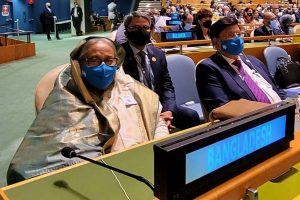
The PM stated in her last proposal that the Rohingya situation is now in its fifth year. Despite this, not a single forcefully displaced Myanmar nationals has been able to return home. Despite the uncertainties produced by recent political developments in Myanmar, Bangladesh anticipates increased international emphasis and active support in finding a long-term solution to this situation. Myanmar, she said, must establish the right conditions for them to return. Bangladesh’s government is well prepared to collaborate with the world community on this critical issue. She further stated that Bangladesh had moved some of the forcefully displaced Myanmar citizens to ‘Bhasan Char’ in order to assure their temporary stay in Bangladesh.
Sheikh Hasina also stated that the international community must engage constructively to find a long-term solution to the issue by ensuring the Rohingyas’ safe, sustainable, and dignified return to Rakhine State. While the government of Bangladesh anticipates the ASEAN leadership to continue their efforts, the international community must back all accountability mechanisms. The PM has expressed her desire for a peaceful, stable, and prosperous South Asia. On Afghanistan, she said that it is the responsibility of the Afghan people to rebuild their nation and determine their own future. Bangladesh is willing to continue collaborating with the Afghan people and the international community on the country’s socio-economic development.
As Bangladesh is gradually becoming a country that uses nuclear energy for electricity generation, she stated her concern on the proliferation of nuclear weapons. Regarding the nuclear disarmament, she stated that, as enshrined in its constitution, Bangladesh has always been a staunch supporter of complete nuclear disarmament. She said that the total elimination of nuclear weapons and other weapons of mass destruction is the ultimate guarantor of international peace and security. Based on that conviction, Bangladesh government ratified the Treaty on the Prohibition of Nuclear Weapons (TPNW), which went into effect earlier this year.
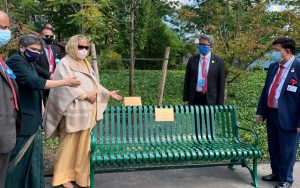
Bangladesh, she continued, has established a brand name in UN peacekeeping operations as a strong proponent of the “Culture of Peace.” Bangladesh has shown outstanding achievements in executing the Sustainable Development Goals, ensuring food security, empowering women, scaling up people-centric development programs, and embracing new solutions for stable growth are well known,” she said. Therefore, despite the onslaughts of the Covid-19 pandemic, Bangladesh is on course to become a middle-income country by 2021, a developed country by 2041, and a prosperous Delta by 2100.
Sheikh Mohammad Fauzul Mubin
Member, Central Committee
Bangladesh Awami Jubo League
(Previously published in the international magazine ‘Diplomats World‘)
